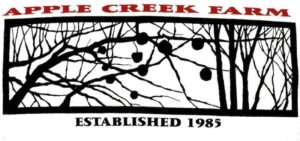Apple Creek Farm, LLC is a MOFGA certified organic farm located in Bowdoinham Maine. The farm was established by the Galle family in 1985 and is now run by the second-generation. Jake Galle and Abby Sadauckas co-own and operate the farm utilizing a variety of sustainable farming practices, including multi-species grazing. The farm produces certified organic, grass-fed beef, lamb and goat, as well as pasture-raised, certified organic poultry (broilers, geese and turkeys) and free-range certified organic eggs. Other livestock products include: hay, wool, cashmere, sheep and goat skins. Apple Creek Farm products are sold locally in Brunswick year-round at both farmers markets and local food retailers.
|
|
| Ownership Structure | 100 |
| Average Flock Size | 100 |
| Single or Double Henhouses | 100 |
| Other Certifications (bonus points) | 100 |
| Organic Certifier | 100 |
| Commitment to Organics | 80 |
| Indoor Space per Bird | 60 |
| Indoor Enrichments | 100 |
| Litter Management | 80 |
| Natural Light | 100 |
| Outdoor Space per Bird | 100 |
| Popholes/Exit to the Outdoors | 100 |
| Outdoor Enrichments | 100 |
| Outdoor Space Exemptions | 90 |
| Outdoor Management System | 90 |
| Manure Handling System | 100 |
| Forced Molting | 100 |
| Beak Trimming | 100 |
| Laying Hen Lifespan | 80 |
| Use of Spent Hens | 100 |
| Death Loss Rate | 80 |
| Pullets | 80 |
| Pullet Access to Outdoors | 100 |
| Feed Produced on Farm | 50 |
| US Grown Feed | 70 |
| Soy in Feed | Yes |
| Synthetic Amino Acids | 70 |
| Disclosure Rate | 100 |


